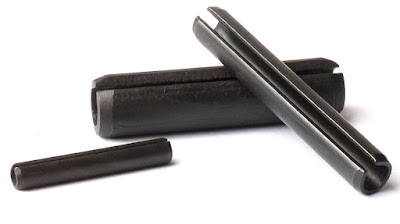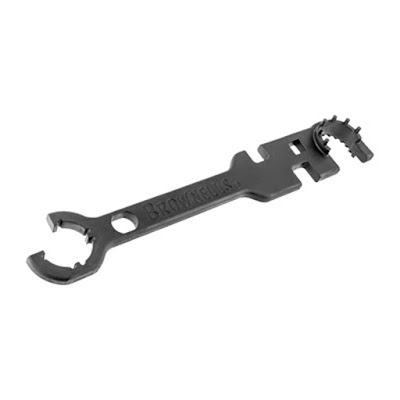When assembling an AR pattern rifle, a variety of tools are used. The firearm
parts involved in the build will affect what tools are needed to some extent; depending on the style of AR being built, there may only be one or two
specialized tools needed to complete the rifle. Many people will already have a number of the tools I’m
about to describe. But if not, these tools are so generally useful for a
variety of projects, it’s a good idea to have them in the toolbox anyway.
Bits and Driver
Nearly everyone has screwdrivers in their home tool box.
Unfortunately, most hardware store screwdrivers are not a good choice for
working on guns, especially flat bits. The majority of less
expensive flat bits are ground with a wedge shape, which will often cause the
blade to ride up out of the screw slot when pressure is applied, often damaging
the screw and possibly the firearm.
In contrast, proper gunsmithing bits are hollow ground,
meaning the sides are ground in a curve ending with the flats parallel to each
other near the tip. This prevents the bit from riding out of the slot and
damaging things. Othias of C&Rsenal talks about this issue in his recent video.
The two types of flat bit screwdrivers: Wedge (left) and Hollow Ground (right)
Depending on the parts being used, flat, hex, and/or Torx
bits may also be needed. I’m a fan of replaceable bit drivers in general, and the Brownells
Magna Tip Bits in particular. Bits can be purchased in sets or individually
and there are a variety of handles as well. If one of the shorter handles is
purchased, the Magna
Tip 4” Extension bit is very useful.
Punches and Hammers
When dealing with coiled spring steel pins known as
roll
pins, it’s very important not to damage the ends during installation or removal.
This is where specialized
Roll
Pin Punches really shine.
Of course, punches aren’t much use without a way to drive
them. A hammer
with removable and replaceable heads, one side brass and the other nylon, is an
excellent general purpose tool.
Vices and Holders
Pretty much any bench vice with a maximum distance between
jaws of four inches will cover most conceivable needs, as long as it’s securely
fastened to a solid bench. A vice this size has enough clearance to hold an
Upper
Receiver Action Block. This accessory reduces the chance of damage when
installing a barrel.
Upper Receiver Vice Block set
Another useful vice fixture is a
Lower
Receiver Vice Block which will keep the lower receiver from shifting when
putting in the fire control parts.
Magnetic Soft Jaws are useful for holding pretty much anything else while reducing
the risk of damage.
Specialized Tools
A bog-standard
¼” by 2” Clevis Pin, while not required, makes installing the front pivot pin on an
AR a much less stressful affair. Everyone who works on these rifles should have
one in their kit.
Standard Clevis Pin
Depending on the style of rifle being built, the other
specialized tool that might be needed is an AR
Armorer’s Wrench. It helps with stock, barrel, and muzzle device
installation and removal.
AR Armorers Wrench
Now that we’ve covered the necessary tools, my next post
will detail the parts required to assemble a functional and safe AR style
rifle.
Have fun, and safe shooting!







Very good information.
ReplyDeleteAfter searching for a few lost detent pins and springs, I bought the Real Avid AR15 PIVOT PIN TOOL. It costs around 12 dollars and while not absolutely needed, it makes the job quite easy.
I'd also getting a specialized pin punch for the bolt catch pin. There are any number of work-arounds, but the right tool makes it a bunch easier with lessened risk of damage.
And the risks of breaking an ear off when installing a trigger guard are worthy of a post all on its own.
Thank you for sharing this information.